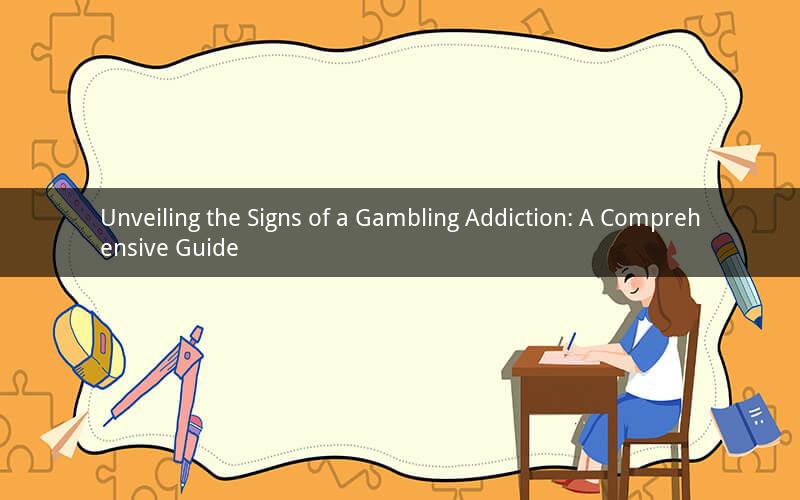
Introduction:
Gambling addiction is a serious issue that affects millions of people worldwide. Identifying whether you or someone you know has a gambling addiction is crucial for seeking help and overcoming this problem. In this article, we will explore the signs and symptoms of a gambling addiction, helping you understand how to recognize it and take appropriate action.
1. Understanding Gambling Addiction:
Gambling addiction, also known as problem gambling or compulsive gambling, is characterized by an uncontrollable urge to gamble, despite negative consequences. It is a behavioral addiction, where individuals find it difficult to control their gambling behavior, leading to significant distress and impairment in various aspects of their lives.
2. Common Signs of a Gambling Addiction:
a. Preoccupation with Gambling:
One of the primary signs of a gambling addiction is preoccupation with gambling. Individuals may constantly think about gambling, planning their next bet, or reliving past gambling experiences. They may also find it difficult to concentrate on other activities or responsibilities.
b. Loss of Control:
Another sign is the inability to control gambling behavior. Despite setting limits or trying to stop, individuals with a gambling addiction may find themselves unable to resist the urge to gamble. This often leads to increased stakes and longer durations of play.
c. Financial Consequences:
Gambling addiction can have severe financial consequences. Individuals may experience significant debt, loss of savings, or even financial ruin. They may also lie to family and friends about their gambling activities to cover up their financial struggles.
d. Emotional and Psychological Impact:
Gambling addiction can have a profound impact on an individual's emotional and psychological well-being. Feelings of guilt, shame, and anxiety may arise, leading to increased stress and depression. Relationships may also suffer as individuals prioritize gambling over their loved ones.
e. Social Consequences:
Gambling addiction can disrupt social relationships and activities. Individuals may isolate themselves from friends and family, neglect their responsibilities, and prioritize gambling over social engagements. This can lead to feelings of loneliness and isolation.
3. Recognizing the Severity of a Gambling Addiction:
Determining the severity of a gambling addiction is crucial for seeking appropriate help. The following criteria can help assess the severity:
a. Time Spent Gambling:
Consider how much time you spend gambling. If it occupies a significant portion of your day or disrupts your daily routine, it may indicate a gambling addiction.
b. Financial Struggles:
Evaluate the financial impact of your gambling. If you find yourself in debt or struggling to meet financial obligations due to gambling, it is a sign of a severe addiction.
c. Emotional and Psychological Symptoms:
Assess the emotional and psychological impact of your gambling. If it leads to feelings of guilt, shame, anxiety, or depression, it is a sign of a severe addiction.
4. Seeking Help for a Gambling Addiction:
Recognizing a gambling addiction is the first step towards overcoming it. Here are some ways to seek help:
a. Professional Help:
Seeking help from a mental health professional, such as a therapist or counselor, specialized in gambling addiction, is crucial. They can provide personalized treatment and support.
b. Support Groups:
Joining support groups like Gamblers Anonymous can provide a supportive community and share experiences with others who have faced similar challenges.
c. Financial Counseling:
If financial difficulties are a significant aspect of your gambling addiction, seeking help from a financial counselor can help you regain control over your finances and develop a plan to overcome debt.
5. Questions and Answers:
Q1: Can a gambling addiction be cured?
A1: Yes, a gambling addiction can be overcome with proper treatment and support. It requires dedication and commitment to change.
Q2: How long does it take to recover from a gambling addiction?
A2: The duration of recovery varies for each individual. Some may experience immediate progress, while others may require ongoing treatment and support.
Q3: Can medication help treat a gambling addiction?
A3: Medication is not commonly used to treat gambling addiction. However, it may be prescribed in certain cases to manage underlying mental health conditions that contribute to the addiction.
Q4: Can family and friends help in overcoming a gambling addiction?
A4: Yes, family and friends play a crucial role in supporting individuals with a gambling addiction. They can provide emotional support, encourage seeking help, and offer practical assistance.
Q5: Is it possible to gamble responsibly?
A5: While it is possible to gamble responsibly for some individuals, others may be more susceptible to developing a gambling addiction. It is important to be aware of personal risk factors and set boundaries to prevent excessive gambling.
Conclusion:
Recognizing the signs of a gambling addiction is essential for taking appropriate action. By understanding the common signs, assessing the severity, and seeking help, individuals can overcome this addiction and regain control over their lives. Remember, seeking help is a courageous step towards a healthier and more fulfilling future.